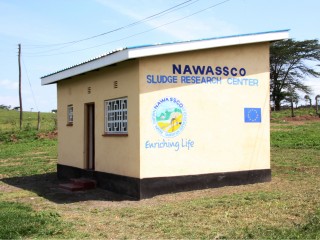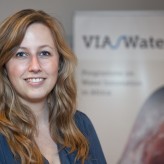Project Results:
The partners that implemented the NCSP pro-poor sanitation programme in Nakuru recognized the need to make business out of fecal sludge to stimulate the entire sanitation chain. VIA Water provided support in the practical research on nine identified sludge based products (bio-fertilizers, bio-fuels), leading to the selection of bio-briquettes as the most promising product.
With a serious up-topping, a commercial production facility was built that is run by Nawasscoal, a subsidiary of the utility. The last part of the funding was used to solve some of the bottlenecks in the production line, which were addressed by an external evaluation team. The briquettes are sold under the name Makaadotcom.
The sales network of Scode Ltd is used, that is meanwhile promoting improved cook stoves. This is a very strong marketing combination, leading to a drastic reduction of the devastating use of charcoal. For each kg of bio-briquettes used in an energy efficient cookstove more than 30 kg of wood can be saved compared to a traditional stove. This project provides a breakthrough in sanitation.
Total contract volume became € 664,164, of which € 245,912 was provided as a subsidy by VIA Water.
Key results
- Briquette factory with actual production of 10 tonnes/month but with an expansion option to 250 tonnes/month
- Business Plan for the newly created subsidiary NAWASSCOAL
- Well documented report of Phase 1 with research reports on bio-fuels and bio-fertilizers; partly the result of good co-operation with Egerton University
Tips for the future
- To get process and production expertise earlier in the design stage
- To develop as a real business entity
Potential for growth
The market potential is flourishing, because of government restrictions on traditional charcoal. With a well performing production line, NAWASSCOAL will be able to attract external financing for expansion. After the business case is proven, NAWASSCOAL will provide services to other towns that show interest in reproduction.
Project partners
Vitens Evides International, SNV, NAWASSCO, Scode, Egerton University
Period
October 2015 – May 2019 (2 contracts)
Location
Nakuru, KenyaNakuru, Kenya
Last project updates
Background
Nakuru, located 160 km northwest of Nairobi, is an agricultural hub. Town population has tremendously increased over the past decades which results in high demand for basic services such as housing, roads, water and sanitation. Low Income Areas (LIAs) house over 370,000 people. Two-third of houses are landlord-owned with the County being the main landlord. Less than 20% is connected to sewer which results in majority pit-latrines or septic tanks.
This results in challenges: Law prohibits pit-latrines in urban areas and policies are restrictive towards pit-emptying and sludge transportation. Partnerships with Public Health (PH) and the Natural Environment Management Authority (NEMA) are crucial. Bills related to pit-emptying and regulation of energy sources like charcoal are promising. Another challenge is cultural sensitivity towards faecal matter products. This can be overcome through awareness creation if products are of high-quality, attractive, available and low-cost.
Project Plan
During the 18 months, the goal is to develop, test and introduce bio-fuels and bio-fertilisers to the Nakuru market. During the first 6-months period products will be developed and tested resulting in final products and production processes decided on. In the next 6-months it is expected production processes will be set-up and production will be on-going while certification from the main certifying body will be obtained. The last 6-months of the project will focus on awareness creation, marketing activities and sales campaigns to introduce products to target groups. The activities will be implemented jointly by NAWASSCO and social enterprises with support of VEI & SNV.
Target group
The project targets local social enterprises/NGOs to adopt fecal matter product production as a social businesses in partnership with NAWASSCO. It targets people within Low Income Areas and farmers in the wider Nakuru area as purchasers and beneficiaries of the products.
Specific for Bio-fuels:
-Low Income Households (HHs); specifically women
-CBOs/Youth groups; distribution and sales of the products
-Small to medium size businesses – chicken farmers;hotel-restaurants
Specific for Bio-fertilisers:
-Small-medium scale farmers
-Low Income HHs engaged in urban agriculture
Sustainability
The project follows the FIETS principles. Most important is that by making marketable products from waste, the activity should become self-sustaining.
Overview of Goals
The overall objective/goal of this project is production and sales of faecal matter and urine products in Nakuru County by end of 2016. The purpose of the project is to develop faecal matter and urine products that are viable and introduce them into the Nakuru market through Public Private Partnerships between the local water company and social enterprises. It is a Proof of Concept of product lines, identified under a parallel EU funded NCSP project.
Results and indicators
- 2. Social enterprises producing fecal matter and urine products at sizable scale
- 1. Financial and sustaianble business models in place for bio-fuel and bio-fertilizer production
- 1.1 NAWASSCO has paertnered with social enterprises
- NAWASSCO production site operational 1 ( target )
- Suitable social enterprises identified 2 ( target )
- 3. Fecal matter products for sale in Nakuru market
- 2.1 Fecal matter products developed successfully
- fecal matter products developed and tested 4 ( target )
- end products 2 ( target )
- 1.2 Sustainable business models developed
- Number business plans developed 2 ( target )
- ESIA conducted and approved by NEMA 1 ( target )
- 3.1 Fecal matter products certified
- Certification by KEBS 2 ( target )
- 2.2 Production fecal matter products in operation
- facilities set up and production process in operation 2 ( target )
- 3.2 Fecal matter products introduced to market
- product communications and promotion activities 3 ( target )
- demnstration and awareness events 20 ( target )
- outlets selected for sales 10 ( target )



